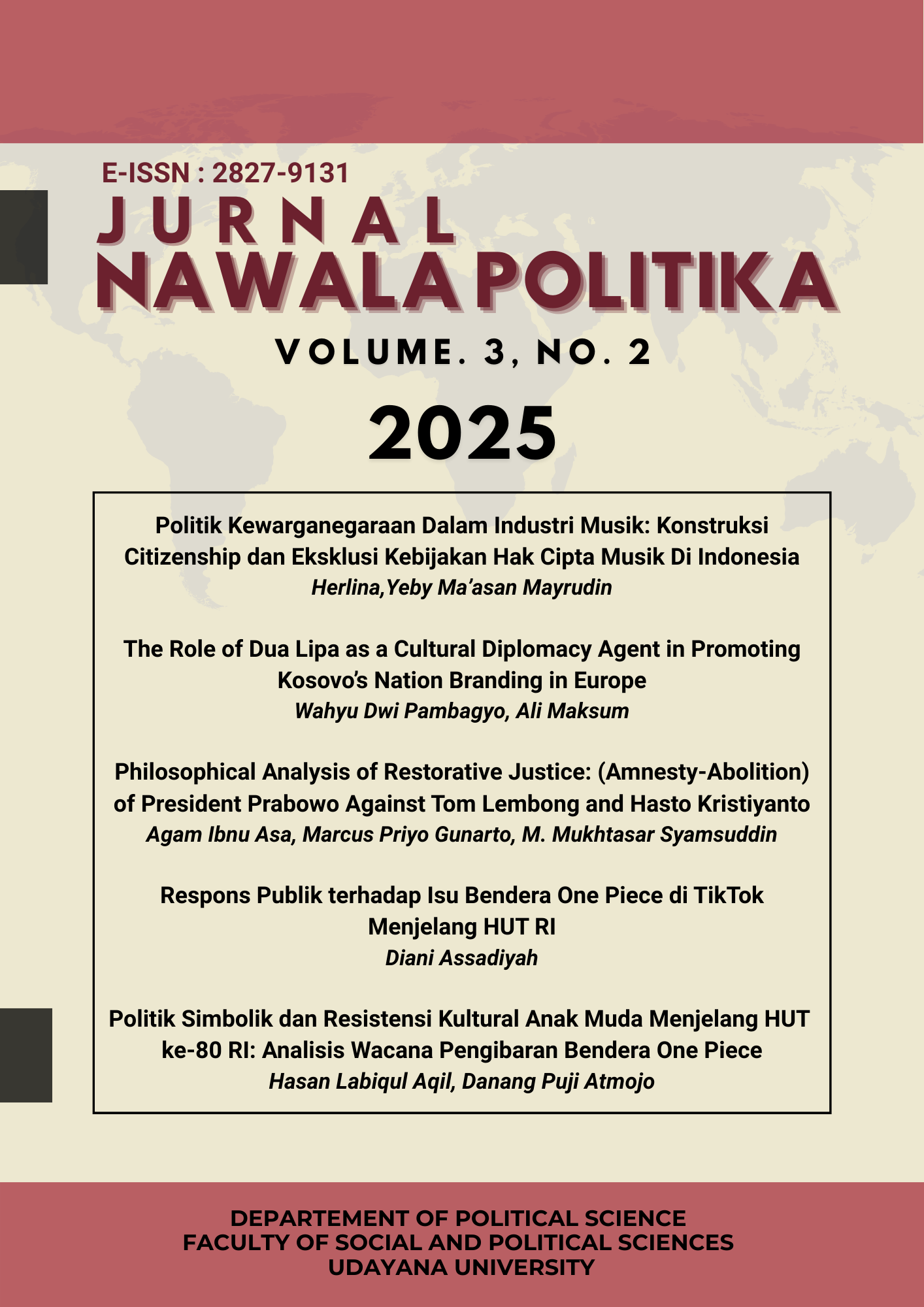Philosophical Analysis of Restorative Justice: (Amnesty-Abolition) of President Prabowo Against Tom Lembong and Hasto Kristiyanto
DOI:
https://doi.org/10.24843/jnp.v3i2.51Keywords:
Restorative Justice, Amnesty, Abolition, Criminal Justice, Prabowo's PolicyAbstract
This study presents a philosophical analysis of the intersection between restorative justice and criminal law in the context of granting amnesty and abolition by President Prabowo Subianto to Tom Lembong and Hasto Kristiyanto. The primary focus of this study is to evaluate whether these policies are justifiable under a restorative framework, taking into account the principles of accountability, recognition, and reconciliation. Using normative legal research methods and philosophical approaches, this article argues that although amnesty and abolition are legitimate instruments for achieving political stability, their implementation risks eroding accountability if it is not transparent. Its main findings suggest that these actions are not completely restorative because they are top-down and stop the accountability process. However, it can align with restorative principles if a transparent, accountable, and recovery-oriented process accompanies it. This study concludes that the success of the restorative approach lies in the process, which demands public recognition, the participation of affected parties, and a sincere commitment to improvement.
Downloads
References
Andini, O. G., Nilasari, N., & Eurian, A. A. (2023). Restorative Justice in Indonesia Corruption Crime: A Utopia. Legality: Jurnal Ilmiah Hukum, 31(1), 72–90. https://ejournal.umm.ac.id/index.php/legality/article/view/24247
Ansorg, N., & Kurtenbach, S. (2023). Promoting peace and impunity? Amnesty laws after war in El Salvador and beyond. Journal of Global Security Studies, 8(2), ogad010
Asa, A. I., & Syamsuddin, M. M. (2025). Rekontruksi Makna Pancasila Dalam Konteks Sumber Tertib Hukum (Tinjauan filsafat hukum). Bhineka Tunggal Ika: Kajian Teori Dan Praktik Pendidikan PKN, 12(1), 59–77. https://jbti.ejournal.unsri.ac.id/index.php/jbti/article/view/193
Asa, A. I., Munir, M., & Ningsih, R. S. M. (2021). Nonet and Selznick's Responsive Law Concept in a Historical-Philosophy Perspective. CREPIDO, 3(2), 96–109. https://doi.org/10.14710/crepido.3.2.96-109
Asa, A. I., Syamsuddin, M. M., Zubaidi, A., & Wahyudi, A. (2025). Restorative Justice is a Progressive Breakthrough in Resolving Criminal Law Problems. International Journal of Law Reconstruction, 9(1). https://jurnal.unissula.ac.id/index.php/lawreconstruction/article/view/41804/0
Ashalirrohman, Y. (2025). Deontology and Equality in Corruption Law Enforcement. Iuris Philosophia Journal, 1(1), 1–10. https://jurnal.jurisprudenceinsights.com/index.php/Iurisphilosophiajournal/article/view/6
Azis, A. N., Safiudin, K., Ramdhani, R. A., & Hadad, Q. R. (2022). Restorative Justice for Perpetrators of Corruption. Legal Brief, 11(5), 3498–3504. https://legal.isha.or.id/index.php/legal/article/view/603
Bosniak, L. (2013). Arguing for Amnesty. Law, Culture and the Humanities, 9(3), 432–442. https://www.researchwithrutgers.com/en/publications/arguing-for-amnesty
Childress, J. F. (1973). The Amnesty Argument. CrossCurrents, 23(3), 310–328. JSTOR, http://www.jstor.org/stable/24457861.
Flora, H. S. (2018). Keadilan Restoratif sebagai Alternatif dalam Penyelesaian Tindak Pidana dan Pengaruhnya dalam Sistem Peradilan Pidana di Indonesia. University Of Bengkulu Law Journal, 3(2), 142–158. https://doi.org/10.33369/ubelaj.3.2.142-158
Freeman, M., & Pensky, M. (2012). The Amnesty Controversy in International Law. In Amnesty in the Age of Human Rights Accountability: Comparative and International Perspectives (p. 42).
Gibson, J. L. (2002). Truth, Justice, and Reconciliation: Judging the Fairness of Amnesty in South Africa. American Journal of Political Science, 46(3), 540–556. https://doi.org/10.2307/3088398
Gunarto, M. P. (2009). Sikap Memidana yang Berorientasi pada Tujuan Pemidanaan. Old Website of Jurnal Mimbar Hukum, 21(1), 93–108. https://jurnal.ugm.ac.id/jmh/article/view/16248
Han, J., Pardo, R. P., & Cho, Y. (Eds.). (2023). South Korean politics. Oxford University Press.
Hernández, K. L. (2023). Amnesty or Abolition? Felons, Illegals, and the Case for a New Abolition Movement. In The Border Reader (pp. 608–627). Duke University Press.
Kant, I. (1785). Groundwork of the Metaphysics of Morals. Harvard University.
Kantor Wilayah Kemenkum RI Provinsi Kalimantan Tengah. (2025, December 15). Menteri Hak Asasi Manusia : Aspek Kemanusiaan dan Rekonsiliasi Jadi Pertimbangan Presiden Berikan Amnesti. https://kalteng.kemenkum.go.id/berita-utama/menteri-hak-asasi-manusia-aspek-kemanusiaan-dan-rekonsiliasi-jadi-pertimbangan-presiden-berikan-amnesti
Kompas.com. (2025, August 1). Kronologi Kasus Tom Lembong: Disidik Menjelang Pilpres, Dibebaskan Prabowo. https://nasional.kompas.com/read/2025/08/01/08130231/kronologi-kasus-tom-lembong-disidik-menjelang-pilpres-dibebaskan-prabowo?page=all
Mill, J. S. (1863). Utilitarianism. Parker, Son, and Bourn.
Prasetyo, A. (2025, August 1). Mengenal Konsep Amnesti dan Abolisi yang Diberikan Kepada Hasto dan Tom Lembong. Hukumonline.com. https://www.hukumonline.com/berita/a/mengenal-konsep-amnesti-dan-abolisi-yang-diberikan-kepada-hasto-dan-tom-lembong-lt688c9b50d7c90/
Prasetyo, A. (2025, July 18). Divonis 4,5 Tahun Penjara di Kasus Impor Gula, Tom Lembong: Saya Terbukti Tidak Punya Mens Rea. Hukumonline.com. https://www.hukumonline.com/berita/a/divonis-4-5-tahun-penjara-di-kasus-impor-gula--tom-lembong--saya-terbukti-tidak-punya-mens-rea-lt687a4dbbcd428/
Rapoport, D. C. (2022). Waves of global terrorism: From 1879 to the present. Columbia University Press.
Rawls, J. (1971). A Theory of Justice. The Belknap Press of Harvard University Press.
Ruggiero, V. (2011). An Abolitionist View of Restorative Justice. International Journal of Law, Crime and Justice, 39(2), 100–110. https://www.sciencedirect.com/science/article/pii/S1756061611000279
Sarkin, J. (2001). The Tension between Justice and Reconciliation in Rwanda: Politics, Human Rights, Due Process and the Role of the Gacaca Courts in Dealing with the Genocide. Journal of African Law, 45(2), 143–172. http://www.jstor.org/stable/3558953
Sayers, N. (2020). The Relationship Between Restorative Justice and Prison Abolition. In Neo-Colonial Injustice and the Mass Imprisonment of Indigenous Women (pp. 35–52). Springer International Publishing.
Sharnak, D. (2023). From Elections to the Ley de Caducidad. In Of Light and Struggle: Social Justice, Human Rights, and Accountability in Uruguay (pp. 170–197). University of Pennsylvania Press. https://doi.org/10.2307/j.ctv2whxctt.11
Stahly-Butts, M., & Akbar, A. A. (2021). Reforms for Radicals? An Abolitionist Framework. UCLA Law Review, 68, 1544.
Tim Kompas. (2025, July 26). Mengapa Hasto Divonis 3,5 Tahun untuk Kasus Suap, tetapi Tak Terbukti Rintangi Penyidikan?. Kompas. https://www.kompas.id/artikel/mengapa-hasto-kristiyanto-divonis-35-tahun-untuk-kasus-suap-tapi-tak-terbukti-rintangi-penyidikan
Wahyuni, W. (2025, March 17). Fakta Menarik Sidang Perdana Hasto Kristiyanto, dari Dakwaan hingga Dukungan Massa. Hukumonline.com. https://www.hukumonline.com/berita/a/fakta-menarik-sidang-perdana-hasto-kristiyanto--dari-dakwaan-hingga-dukungan-massa-lt67d7c481a2be3/
Zulfa, E. A. (2009). Keadilan Restoratif di Indonesia (Studi tentang Kemungkinan Penerapan Pendekatan Keadilan Restoratif Dalam Praktek Penegakan Hukum Pidana). (Unpublished doctoral dissertation). Universitas Indonesia.
Downloads
Published
Issue
Section
License
Copyright (c) 2025 Dr. Agam Ibnu Asa, S.Fil., S.H., M.Phil., Prof. Dr. Marcus Priyo Gunarto, S.H., M.Hum., Prof. Drs. M. Mukhtasar Syamsuddin, M.Hum., Ph.D of Arts. (Author)

This work is licensed under a Creative Commons Attribution 4.0 International License.



















